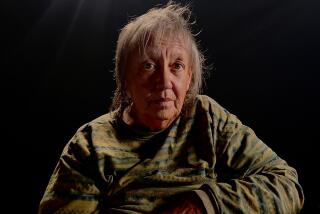High on ‘Low’
- Share via
In cinematographer-turned-director Aaron Schneider’s fact-based mood piece “Get Low,” Robert Duvall delivers a captivating performance as Felix Bush, a loner dubbed the Mysterious Hermit of Caleb County, who, after 40 years of self-imposed seclusion, opts to hold a funeral for himself before his actual demise.
“I remember thinking, ‘Oh, I’m gonna watch him and study his process,’ ” recalled Sissy Spacek, who stars with Duvall in the Southern-set tale. “Well, you can’t see it. It’s invisible. He’ll just be chatting with you, and then they’ll call him to the set and he is Felix Bush.”
Spacek, of course, knows a thing or two about disappearing into character. The petite actress with the big blue eyes has enjoyed a decades-long career filled with landmark roles: the teenage Holly in Terrence Malick’s 1973 drama “Badlands,” the tormented and telekinetic Carrie White in Brian De Palma’s 1976 Stephen King adaptation “Carrie,” and country music legend Loretta Lynn in 1980’s “Coal Miner’s Daughter,” for which she won a lead actress Oscar.
With “Get Low,” which opened in limited release Friday, Spacek tackles another interesting woman, the widow Mattie Darrow, who was courted by Bush before he retreated to solitude. When Mattie meets Felix for the first time after that profound absence, she lights up from within, and the audience can see remnants of a smitten young girl inside the mature woman’s eyes.
“There’s a grace about her, she’s so luminous, but she can also capture that real internal turmoil,” said producer Dean Zanuck.
Spacek said she was drawn to Chris Provenzano and C. Gaby Mitchell’s screenplay, based on the real-life story of a Tennessee man who in 1938 staged his own funeral party, because it was filled with unexpected twists. Sitting in a suite at a Beverly Hills hotel earlier this week, she imitated herself reading through the script for the first time. She laughed as she recalled thinking, “What? What? What? Every page was a surprise.”
When director Schneider first met with the celebrated actress about the part, he said they spent four hours in her agent’s office going over the story in intense detail. “I don’t think we even made it through the whole script,” he said.
Her interest was evident on set as well. “She’s a sponge,” Schneider said. “She wants to know everything she can about everything. And somehow, magically, she’s able to siphon it into a performance that’s a pretty remarkable thing to watch.”
For Zanuck, Duvall and Spacek made such a natural screen couple, he couldn’t believe they hadn’t worked together before. They actually did both appear in the 2008 comedy “Four Christmases,” but the closest they came to sharing a scene there was when “I scowled at him one day as he walked by,” Spacek said.
What’s perhaps most remarkable about Spacek’s rich career is that she never set out to be an actress. She moved to New York from Texas as a teenage singer-songwriter and lived with her cousin Rip Torn and his wife Geraldine Page. She briefly studied acting at the Strasberg Institute, but “I didn’t know what I was learning,” she said. “I’ve learned most from the actors and directors that I’ve worked with through the years.”
She credits her “Badlands” costar Martin Sheen with teaching her everything about how to behave on a set. “Oh my gosh, what a wonderful man,” Spacek said. “He just throws himself into anything. He’ll wrap cable, if need be.”
She was also impressed by production designer Jack Fisk and his “Stanislavski method of art direction,” as she puts it: “I would find things in the drawers in the set of my bedroom in my character’s house,” little things that helped her deliver a fuller performance but details that the audience would never see.
Spacek married Fisk a year after the film’s release. The couple has two daughters: Schuyler, an actress and musician, and Madison, a sculptor and filmmaker.
“They’re doomed to the art life, I’m afraid,” Spacek said.
Spacek attributes much of her success to “coming along at the right time” -- she began working at the same time challenging independent cinema began to break free of the stranglehold of the studio system.
“I got to ride the crest of that wave -- I was really fortunate, I worked with wonderful directors,” she said, citing filmmakers including Malick, Robert Altman (1977’s “3 Women”), David Lynch (1999’s “The Straight Story”) and Fisk, who directed her in 1981’s “Raggedy Man,” one of her favorites.
She’s just as happy working with new directors, such as “Get Low’s” Schneider and Todd Field, whose “In the Bedroom” earned her one of her six Oscar nominations. “It’s the passion level” that appeals to her, she noted.
Now 60, Spacek is continuing to work steadily. She’s even moved into new territory, taking the part of Marilyn Densham in “Big Love” last season, for which she earned an Emmy nomination for guest actress in a drama series.
“Mean as a snake,” she said of Marilyn, a canny Washingtonian who manipulates Bill Paxton’s patriarch’s wife Barb (Jeanne Tripplehorn) and worms her way into his casino business. “It was so fun, but I kind of felt like I was trying to keep myself under water all the time, rather than letting myself bob to the surface. It’s not a natural place for me to reside, in that angry, evil kind of place.”
She took the role, acting alongside her old friend Paxton, to “get my feet wet” in episodic TV. And she loved it.
By the end of shooting a film, Spacek pointed out, everyone in the cast and crew gets to know one another, “Then you cry and it’s over. Episodic TV goes on; it’s wonderful. I think I’d like to do TV. They’re doing great stuff.”
--
More to Read
Only good movies
Get the Indie Focus newsletter, Mark Olsen's weekly guide to the world of cinema.
You may occasionally receive promotional content from the Los Angeles Times.









